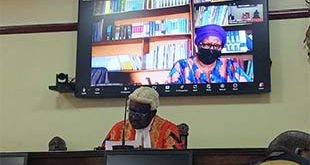
Kampala, Uganda | THE INDEPENDENT | Lecturers in the Department of Social Work and Social Administration (SWASWA) at Makerere University have expressed disappointment with the continued undermining of their course by President Museveni.
The staff say that their morale is low even as the new Semester resumes due to negative comments by the President that Swaswa is a useless course. The department has a total 21 academic staff where four (4) are on study leave.
Museveni has for a number of years continued to brand several arts courses useless courses, attracting debate about the relevance of Art/Humanities courses.
Dr Denis Muhangi, the acting Head of Department of the Makerere University’s Social Work and Social Administration says they are worried that the continued statements by the President could inform government and institutional withdrawal of support to the department.
Dr Muhangi says despite the negative touts by the President, the course continues to be the sought after in the humanities after Bachelor Arts in Journalism and Communication.
“It is still a highly demanded course. Students who do arts combinations at A ‘level want to do Law, SWASA and Journalism there is no question about that. It’s only that because of our capacity we admit a few. And we are still taking the cream by the way, those who have passed very well,” Dr Muhangi says.
Asked why the department has not proactively engaged the public on the relevance of their course, Dr. Muhangi says they fear engaging in advocacy that might antagonize the relations between the state and the institution.
Michael Byamukama, the President- National Association of Social Workers in Uganda (NASWU) who also doubles as Country Representative- International Federation of Social Workers says they are ready to dialogue with the President on the current mistrust and misinformation about the course.
There are approximately 185,000 social work professionals in Uganda (excluding paraprofessional) working in different sectors and 22 Associate members (organizations, universities and line ministries) that subscribe to National Association of Social Workers of Uganda (NASWU).
“Referring to our profession as useless and irrelevant instead of appreciating its contribution in transforming this country is a betrayal. Social workers feel betrayed and undermined by the negative comments from the political leadership of this country,” says Byamukama, the Social Workers Association President.
According to Byamukama, the Social Work profession is a globally respected profession with a representation at the UN through International Federation of Social Workers (IFSW).
He argues that social work is a practice-based profession and an academic discipline which promotes social change, problem-solving in human relationships and the empowerment and liberation of people to enhance well being.
Byamukama suggests that rather than downplaying the importance of the social work profession, government commissions a committee to undertake a study to gather empirical evidence to guide to inform debate and policy decisions.
He also underscored the importance of arts and humanities citing that Uganda’s problems cannot only be solved by science.
“The in initial stages of HIV epidemic, if we had remained stack in science not understanding that the war against HIV had a social aspect, Uganda would not have achieved all the world well known and documented milestones. Professional social workers played a critical role and will continue to do the same in the war against HIV,”
He says Uganda needs a strong social work department in all sectors especially in preparing UPDF officers on foreign peace missions and those retiring from the army including veterans, the most vulnerable, the terminally ill, and children who are battered and abandoned by parents and caretakers.
Byamukama says they equally work to improve the lives of the homeless, the mentally ill, drug and alcohol addicts, victims of domestic violence and families, street children among others.
Makerere started teaching social work and social administration in the 1960s. Dr Muhangi says they have contributed to the human resources who have addressed critical problems of Uganda.
Majority of the lecturers who spoke to URN said the government is detached from the whole understanding of the key roles the disciplines in the humanities have played.
Dr Josephine Ahikire, an associate professor of Gender Studies and the Acting Principal College of Humanities and Social Sciences (CHUSS) says there is a need to educate society enough to appreciate the role humanities and social sciences play in society.
She says warns scholars in the humanities and sciences against being defensive about the President’s outbursts but rather become proactive in their dealing with society through increased research, publications and commitment to their work.
******
URN
 The Independent Uganda: You get the Truth we Pay the Price
The Independent Uganda: You get the Truth we Pay the Price


